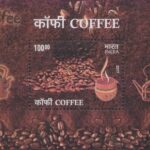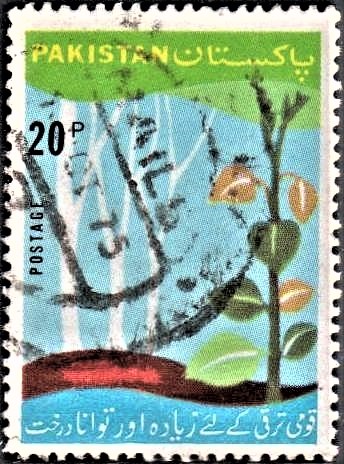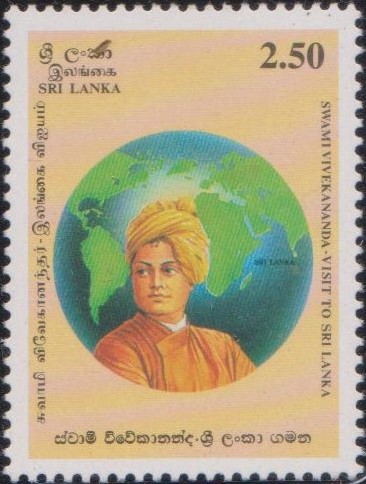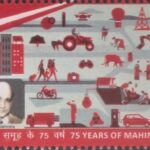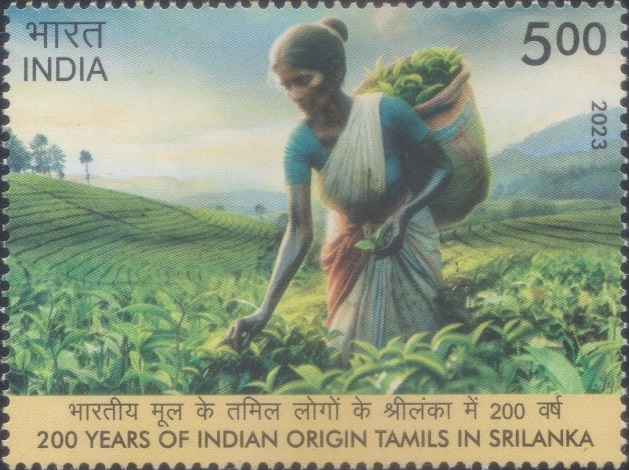
Indian Origin Tamils in Sri Lanka
A commemorative postage stamp on the 200 years of Indian Origin Tamils (IOT) in Sri Lanka :
 Issued by India
Issued by India
Issued on Dec 30, 2023
Issued for : Department of Posts is proud to issue a Commemorative Postage Stamp on 200 Years of Indian Origin Tamils in Sri Lanka, recognising the hardships faced by the Indian Origin Tamils and valuing their contribution to the economic development of Sri Lanka.
Credits :
Stamp/FDC/Brochure/Cancellation Cachet : Smt Nenu Gupta
Type : Stamp, Mint Condition
Colour : Multi Colour
Denomination : 500 Paise
Stamps Printed : 301850
Printing Process : Wet Offset
Printer : Security Printing Press, Hyderabad
About :
- Indian Origin Tamils (IOT) of Sri Lanka are Tamil people of Indian origin, also known as Malayaga Tamilar, who predominantly descend from workers sent from Tamil Nadu to Sri Lanka in the 19th & 20th centuries to work in coffee, tea and rubber plantations. They are instrumental in the development of the plantation sector. These Tamil-speaking people mostly live in the central highlands, also known as the Malayagam or Hill country.
- The first group of Indian Origin Tamils (IOT) arrived in Sri Lanka, then called Ceylon, in 1823 as labourers to work in coffee and then tea, rubber, and cocoa plantations in the hilly regions of Sri Lanka. Later in the 1900s, substantial numbers of Tamils from India also came to settle in Ceylon as financial entrepreneurs and grocers. They were the trading community of IOT, which was not part of the plantation economy and who had come to Ceylon since then. After the British takeover of the administration of Sri Lanka (then known as Ceylon) in the early 19th Century, they involved themselves in various activities, including economic enterprises such as plantation and agriculture.
- The Indian Origin Tamils were put through immense hardship during the British rule in India and Sri Lanka. During the 1830s, Indian Origin Tamils working in coffee estates were not provided with wages. Instead, they were asked to trade coffee beans gathered by them for commodities from shops. Only after 100 years of immigration to Sri Lanka did the Indian Origin Tamils’ hardships become known to the international community.
- The Indian Tamils in Sri Lanka were enumerated as a separate ethnic group for the first time in the census of 1911 when the people of this community became the second-largest ethnic group in Sri Lanka. The government considered them a separate group and named them “Indian Tamils” in the official census from that year onwards. For various administrative and political purposes, the government officially identified the community as “Indian Tamils”.
- In the 1940s, the trade union movement had galvanised the plantation workers into a militant working class. They joined hands with the Lanka Sama Samaja (or Socialist) Party (LSSP), which carried the message of a working-class struggle for liberation from exploitation by mostly British plantation companies. The Ceylon Citizenship Act of 1948 made the IOT community stateless.
- As they had no means of electing anyone to the Parliament, they ceased to be a concern to the Sri Lankan Parliament. The plantation workers were thus forgotten from 1948 to 1964. They were unable to profit from any progressive legislation. The housing, health and education of the plantation workers were neglected.
- A Satyagraha campaign was launched to protest the deprivation of representation by the Indian Tamil leaders in 1952 by the CWC led by Soumyamoorthy Thondaman, Abdul Aziz, G.K. Motha, and P. Perisundaram, K. Rasalingham, C.R. Motha, Kottampalli Govindan Sellappa Nayar, Vaithiyalingham Palanisami Pillai and many others participated in this struggle. It occurred at the Galle Face Green, in front of Ceylon’s parliament.
- After making the IOT community stateless, Citizenship rights granted according to eligibility criteria set out in a few enactments enabled Indian Tamils to become part of the country’s permanent population. This was a long process. There was much political manoeuvring by the Indian Tamil leaders and the regimes in power at various times to solve problems. Also, the process imposed on the Indian-origin Tamils a price which they paid through heavy sacrifices and financial hardships. After two generations or more of Indian Tamils after the Independence of Sri Lanka, the final batch of the 300,000 stateless IOT population was granted citizenship in 2003 by a Bill proposed to the Sri Lankan Parliament by Arumugam Thondaman. The IOTs suffered the agony of being a stateless community. Accordingly, the Indian Tamil population in Sri Lanka experienced different issues and trends during the last two hundred years of their stay.
- The current political regime in India followed a proactive approach to address the issue of IOT. Prime Minister Narendra Modi visited central Sri Lanka in May 2017, where Indian Origin Tamils were settled and inaugurated various projects completed with the aid of the Government of India. This includes the completion of 4,000 concrete houses for the Indian Origin Tamils and the announcement of 10,000 new houses.
- During the visit of Sri Lankan President Ranil Wickremesinghe to India on 21st July 2023, Prime Minister Narendra Modi announced the implementation of various projects worth Rs 75 crore for Indian-origin Tamil citizens of Sri Lanka while celebrating the 75th anniversary of diplomatic relations with Sri Lanka and also completion of 200 years of the arrival of Tamil community of Indian origin in Sri Lanka.
- On the 2nd of November 2023, Union Finance Minister Smt. Nirmala Sitharaman participated and graced the ‘NAAM 200’ organised by the government of Sri Lanka.
- Text : Referenced from content provided by proponent.
Subscribe
Login
0 Comments
Oldest


